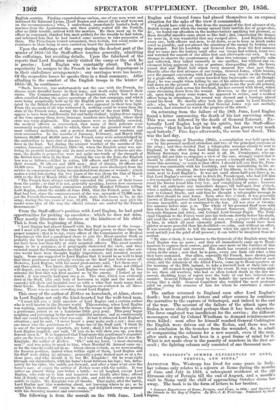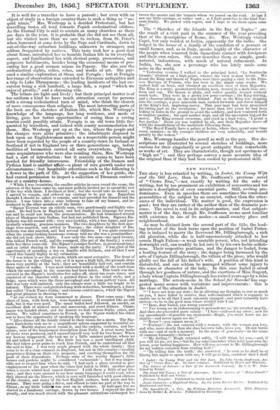MRS. WESTROPP'S SUMMER EXPERIENCES OF ROME, PERI) GIA, AND SIENA..
ALTHOUGH Mrs. Westropp has lived for some years in Italy, her volume only relates to a sojourn at Rome during the months of June and July in 1854, a subsequent residence at the old Etruscan city of Perugia till the end. of August, and a month's visit to Siena until the chill of approaching October drove her away. The book is in the form of letters to her brother.
* Summer Experiences of Rome, Perugia, and Siena, in 1854: and Sketches of the Islands in the Bay of Naples. By Mrs. J. E. Westropp. Published by Skef- Anton.
It is well for a traveller to have a pursuit ; but even with an object of study in a foreign country there is such a thing as "no- quid nimis." Mrs. Westropp is a decided Protestant, but her travelling tastes all tend towards Popish ecclesiastical edifices. As the Eternal City is said to contain as many churches as there are days in the year, it is probable that she did not see them all, but she visited more than we care to reckon, from St. Peter's when honoured at some festa by the Pope and Cardinals, down to out-of-the-way suburban buildings unknown to strangers and seldom frequented by natives. This taste took her a good deal about Rome, introduced her to humble Italian life in its everyday aspect, and familiarized her with clerical pomp, processions, and gorgeous habiliments, besides being the occasional means of pro- curing her her a good sermon minus its Popery. She also saw the ecclesiastical sights, relics, robes, and, works of art. She pur- sued a similar exploration at Siena and Perugia ; but at Perugia her range of observation was extended to Etruscan antiquities and a trip to Lake Thrasymeue ; the leading incidents of the last ex- cursion being a sick landlord, a large fish, a repast "which we enjoyed greatly," and a charming ride. The letters are light and lively; but their principal matter is of too uniform a kind to have much attraction except for persons with a strong ecclesiastical turn of mind, who think the church of more consequence than religion. The most interesting parts of the book are the sketches of Italian life, which Mrs. Westropp's knowledge of the language, her long residence, and mode of living, gave her better opportunities of seeing than a roving tourist could possibly attain. Perugia is an old town little fre- quented by travellers, and indeed with scanty accommodation for them. Mrs. Westropp put up at the inn, where the people and the charges were alike primitive ; the inhabitants disposed to look upon an Englishwoman much as a respectable person might have been regarded by the people of a country-town in. Ireland or Scotland if not in England two or three generations ago, before facilities of locomotion carried all sorts everywhere. Through some acquaintances who were also residing there, Mrs. Westropp had a sort of introduction : but it scarcely seems to have been needed for friendly intercourse. Friendship of the Damon and Pythias kind is another affair—a plant of rare growth under any -circumstances ; but hospitable attentions such as the following is a flower in the path of life. At the suggestion of her guide, she had craved permission to inspect a collection of Etruscan curiosi- ties at a country-house. "While I was extunining the smaller articles incases round the roam, the mistress of the house came in, and most politely invited me to spend the rest of the day with them. I declined at first ; but she would take no denial; so I agreed to remain, and ordered my carriage to be put up. Zappoloni thought I should be asked to remain, and had provided for himself and the driver. I was taken into a state bedroom to take off my bonnet, and in- troduced to the other members of the family.
"Signor Terrossi was an elderly man, very gentlemanly and highly edu- cated. He had been in England, and had studied our language for years, but said he could not learn the pronunciation. He had translated several plays of Shakspere into Italian, but had not published them. Signora En- richetta was his second wife ; very nice-looking, with a fine figure, and par- ticularly winning, gracious manners. The two daughters by the first mar- riage were married, and settled in Tuscany ; the eldest daughter of En- riehetta was also maxried, and had, several children. I was quite surprised when the young-looking handsome woman told me she was a grandmother: she did not look above thirty. I saw only the two sons—one aged twenty, who talked French well, and the youngest, (the pet of the family,) a sweet little boy three years old. The Signor's younger brother, (a great musician,) and an artist staying in the house, made up the party. I was glad of the opportunity of spending a day en famille with Italians, and all that I saw raised this family highly in my estimation. "I was taken to see the grounds, which are most extensive. The front of the house is in the village but, as it is upon a high hill, the grounds slope down very prettily at the back ; they are beautifully laid out, and contain three miles of walks. I was most interested with a model of the tomb from which the sarcophagi in the museum had been taken. This tomb was dis- covered in the Signor's territories five miles off, about ten years since, and consisted of one chamber with a painted frieze in the usual style, and a ledge, upon which were the three sarcophagi and various pottery vases. All this was very well imitated, only the colours were a little too bright to be natural. There were cool grottoes hung with stalactites, hermitages, a fancy hut called Uncle Tom's Cabin,' and various contrivances, which the Signor had great pleasure in showing to me. "At one o'clock we were summoned to dinner. First came soup ; then slices of ham, with fresh figs, were handed round. It sounded like an odd dish, but it was very good. The usual boiled beef followed, an omelet, an excellent dish of minced meat and maccaroni, and sweet fritters. Cham- pagne was handed about, and for dessert we had various fruits, cakes, and sweets. We talked sometimes in French, as the Signor wished his eldest son to have the opportunity of speaking the language.
"Alter dinner all the family retired to their rooms for a siesta. The Sig- nora Enrichetta took me to a magnificent saloon supported by beautiful co- lumns. Marble statues stood round it, and the carpets, curtains, and fur- niture, were of the handsomest description from Paris. A. great many books of views were produced, and I amused myself very well for two hours. When my hostess reappeared, she took me to a little summer parlour, where we sat and talked a good deal. Her little boy was a most intelligent child. She had taken great pains to teach him French, and he understood all that she said to him. I was very much pleased with the whole family ; they seem to be of a class common in England, but not in this country—wealthy proprietors living' ontheir own property, and exerting themselves for the good of their dependents. Perhaps some of the worthy Signor's little houses and gardens might be considered ' cockneyish ' ; tut it was impos- sible not to respect him when he said, I had such a place erected to give employment to the poor when the vines first failed in 1849; another place when a severe winter had caused distress.' I told them a little of my his- tory; and they were amused to see how many. languages I could read, when they showed me the library, which is very well furnished with good editions of the classics, and many of the best English authors, both poets and his- torians. They were going a drive, and offered to take me part of the way to Chiusi ; so my little vehiels was sent on in advance. At half-past five we started in A handsome carriage, drawn by two horses. I enjoyed the drive greatly, and was much struck with the pleasant salutations exchanged be-
tween the master and the tenants whom we passed on the road. At last I saw my little carriage, or rather cart ; so I bade good-bye to the kind Ter- rossi family. We parted with regret, and I hope to see them again some day."
The "Sketches of the Islands in the Bay of Naples" are the result of a visit paid in the summer of the year preceding that of the descriptions of Rome, &c. Mrs. Westropp visited Capri, but only resided at Ischia, apparently for the baths. She lodged in the house of a family of -the condition of a peasant or small farmer, and, as in Italy, speaks highly of the character of the people when removed from immediate contact with foreigners and their own rulers. She ever describes them as simple good-
natured, industrious, with much of natural refinement. At Ischia, too, she saw a personage who has lately made some noise in the world.
"Yesterday evening I walked to the principal hotel, La Sentinella Grande,' situated on a high point, whence the view is most lovely. We found the King and Queen of Naples were there paying a visit to the Prin- cess Mariana of Prussia, who has been in the island some weeks. We waited half an hour, and obtained an excellent view of their Majesties. The King is a stout, goodnatured-looking man, dressed in a dark-blue uni- form and cap. The Queen is plain, and rather gaudily dressed without much taste. They were in a pretty low pony-carriage ; the King driving, and a chasseur sitting on the seat behind. Just as the Ring was stepping into the carriage, spoor miserable man rushed forwards and threw himself at the King's feet, imploring mercy. This poor man had been proscribed for taking part in the revolution ; for more than two years he had been hiding in holes in the ground to avoid the soldiery' and now ventured forth to implore pardon ; his aged mother wept, and all the spectators begged for mercy. The King seemed overcome, and cried in a loud voice, I grant a free pardon? Great joy was testified by all, and their Majesties drove off with the benedictions of the multitude following them.
"The Royal Family have a palace at Ischia, where they spend some time every summer ; as the younger children are very unhealthy, and benefit greatly by the waters."
Mrs. Westropp handles the pencil as well as the pen. Her de- scriptions are illustrated by several sketches of buildings, more curious for their singularity or great antiquity than remarkable as works of art. They are characteristic, though not specimens of "high art " ; and they perhaps convey a more accurate idea of the original than if they had been cooked by professional skill.

































 Previous page
Previous page